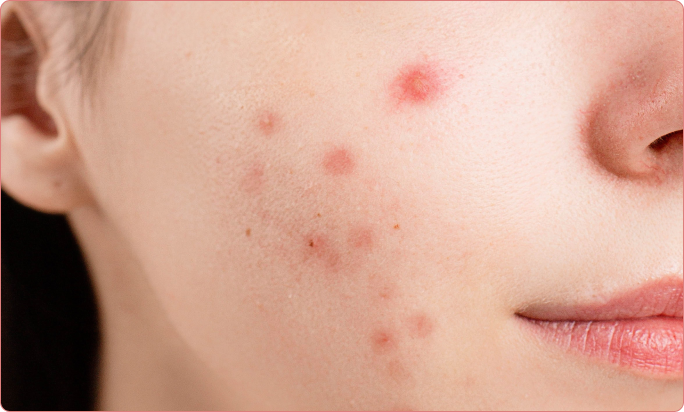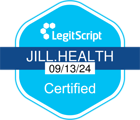Acne – just the word brings feelings of shame, memories of high school, and worries about whether it’s gone for good or about to come back. And it has a big effect on self-confidence and mental health.
While totally natural and normal, acne can be difficult to prevent and treat if you don’t have the right skincare regime, treatments and facts.
Here’s a few myths we’ve come across that we wanted to dispel – the first step in getting acne under control is to know what is true and what is false. Let’s go!
Myth #1 – Acne is caused by makeup
Acne isn’t caused by the wearing of makeup – rather it can be triggered when pores are clogged, causing inflammation and infections within the glands.
Cleaning your skin each day and following a consistent skin care regime means that the day’s dirt, grime and makeup is removed. This helps to reduce the chances of getting clogged pores which can lead to breakouts. But, acne isn’t caused only by clogged pores.
Several studies have determined that acne has a genetic component, with people much more likely to develop it if a close family member also has acne. So while you can’t do anything about your genes, ensuring good skin hygiene though consistent skin care regimes means you lessen your chances of ongoing acne.
Myth #2 – Don’t use moisturisers on skin with acne
Your skin is the largest organ in your body, and acts as barrier between your insides and the outside – keeping this barrier as healthy and intact as possible is absolutely key in not only your skin’s health, but your general health as well.
Moisturising is an important part in barrier health – even for those with oily skin and acne. Many acne treatments can also cause your skin to become dry and irritated, triggering your body to create more oil from your sebaceous glands, which in turn can clog pores and more breakouts.
Look for a moisturiser that is non-greasy and non-comedogenic (means non-clogging) and make sure to apply daily as part of your skincare regime.
Myth #3 – Popping pimples makes healing faster
If you’re like us, you looooove watching those disgusting pimple popping videos. But it’s actually one of the worst things you can do if you have acne. The act of popping a zit is really violent at the pore level – applying force against the skin means breaking blood vessels, irritation and lots of inflammation. Not to mention there is now an easy access point for bacteria to infiltrate your skin barrier and cause even more havoc. Scarring and permanent pigmentation can happen as well.
While satisfying, try your best to not pick or pop and let your medication and skin care routine heal those zits. For those with chronic acne, the only truly effective way of stopping breakouts is with medication – antibiotics, retinoids, chemical exfoliants or steroids. Not your fingers.
Myth #4 – Getting a tan helps treat acne
While getting some rays and developing a tan might temporarily reduce the look of acne (the increase in pigmentation can mask scarring and redness), the damage UV rays do to our skin actually can make acne worse.
UV damages skin cells on a microscopic level, creating things called free radicals that can lead to issues down the road (like skin cancer, yikes). It can contribute to hyperpigmentation (dark spots).
If you are currently using medication to treat acne like retinols, it can make your skin even more susceptible to UV damage.
It’s best to load up on non comedogenic (means non-clogging) SPF 30+ sunscreens, specifically ones with antioxidants and non-greasy formulas. And then make sure to wash it all off before going to bed!
Myth #5 – Intense exfoliation helps get rid of acne
Let’s start with some definitions – exfoliants actually break down and remove dead skin cells. Exfoliants can be:
- Chemical treatments (the ingredient itself can dissolve dead skin cells) like retinoids or vitamin c serums that help promote cell turnover and are often part of an acne treatment plan or
- physical (moving the substance over your skin will remove the dead skin cells) like laser treatments, scrubs with microbeads (don’t use the plastic ones – opt for natural ingredients instead), and salicylic acids.
While regular exfoliation is recommended for everyone, overdoing it (like using a strong chemical peel more than once a week, or physical exfoliation every day) can really irritate your skin, causing more inflammation, dryness and breakouts.
Ensuring that you’re removing dead skin cell build up means pores are less likely to be clogged, as well as providing a better base for other treatments like antioxidant serums and retinols. When using a chemical exfoliant, it is best to build up skin tolerance slowly, by applying it every other day or every third day.
Myth #6 – Eating greasy or unhealthy foods causes acne
This myth has been kicking around for ages (do you remember the ‘eating too many chocolate bars ‘ad from the 90’s?) but there is a kernel of truth to it. ‘Unhealthy’ foods don’t cause acne, but high glycemic foods (carbohydrates like friends or soda) and dairy can affect some hormone levels via insulin spikes which can trigger an acne breakout.
The connection between diet and acne needs to be studied further, but for now, everything in moderation!
Acne and pimples are a very common and natural occurrence on our skin. While society has told us that we need to get rid of it, know that whether you choose to tackle acne or not, your value isn’t defined by your skin.



